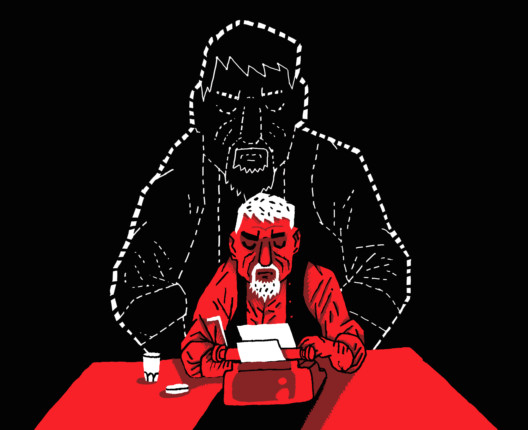
‘F’, by Daniel Kehlmann, translated by Carol Brown Janeaway, Pantheon, 272 pages, $25.95
According to “F”, you don’t exist. “You think you’re reading this? Of course you do. But nobody’s reading this.”
“F”, to be clear, is the alter ego of a novelist depicted within his own novel, which is in turn depicted within this, Daniel Kehlmann’s new novel, “F”.
As the last paragraph demonstrates, a mind-bending circularity is the basis of this compelling read. The creator of the novel-within-the-novel is Arthur Friedland, a struggling writer and father of three sons, none of whom, we are told in the first paragraph, “could recall whose idea it had actually been to go the hypnotist that afternoon”.
Hypnosis clearly fascinates Munich-born Kehlmann, who explored the theme in a BBC radio programme this summer. His 2005 novel “Measuring the World”, a bestseller in Germany about early 19th-century scientific discovery and mathematics, touched on that uncanny zone the rational self can sometimes stumble into. Is such a place magic? Or is it uncharted rationality?
“F” opens on a fateful afternoon in 1984. The three young Friedland sons, Martin and twins Ivan and Eric, watch their father submit to a performing hypnotist. Sceptical at first, Arthur suddenly succumbs to the mind control, flatly confessing his sense of failure as a writer and his indifference to his sons.
Shortly afterwards, he disappears from their lives. The only news they receive during the years that follow is of his notoriety as the author of the novel quoted at the beginning of this review — a work so uncompromisingly nihilistic that it triggers suicides across Germany.
The plot then jumps to the summer of 2008, just before the global financial crash. Martin is an overweight Catholic priest. Eric is an investment banker, and Ivan, an artist and art dealer. The point of view shifts from brother to brother, and it is never clear if their unhappiness is caused by their father or a more general Weltschmerz. In their fraternal dealings, the same conversations are often seen from the perspective of each, yet a chasm of mysterious meaning underlies the narrative. What is behind the knife attack that links the three? Who is the obscure painter, Eulenboeck?
Lacing comedy with menace, Kehlmann revels in a series of ingenious set pieces: the sociopathic Eric, hurtling us down the crazy cellar-stairs of his own mind; Martin, binge-eating chocolate while giving confession to an alcoholic.
Details are crisp yet cryptic. A piece of sharpened metal found in a cellar seems to be fashioned in the shape of a question mark. In the opening episode with the hypnotist, Martin asks himself if anyone would be able to defy his orders. “No one would want to, so no one would do it, and because no one would want to, no one would be able to.”
Self-justifying circularity likewise props up the fraud of Martin’s later priestly faithlessness. Eric takes money off new investors to plug old investors’ losses, and later, after the global crash, goes “around in a circle saying, Who Could Possibly Have Known?”
“F” is for Arthur’s alter ego, and Fraud, Friedland and Fate. An Orson Welles reference is tossed in, so “F” is also F for Fake, a film whose themes resonate in a cleverly crafted subplot based on Ivan’s art-market machinations.
The brothers’ complacency is shaken when one of them suddenly stops existing. Unfortunately, to feel the impact of this, you need a good memory. Only careful rereading of the earlier sections, detailing Arthur’s novel, will remind you that a character — or indeed you, the reader — can stop existing “without warning, right in the middle of a sentence”. In making Arthur’s alter ego write the fate of Arthur’s own son, “F” comes full circle, although its clarity is lost in an overly protracted ending.
–Financial Times








